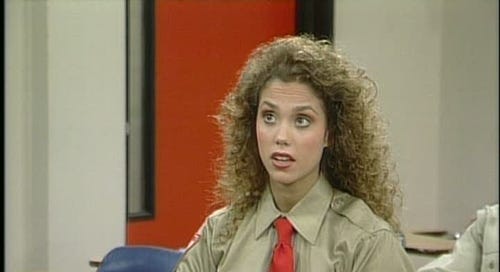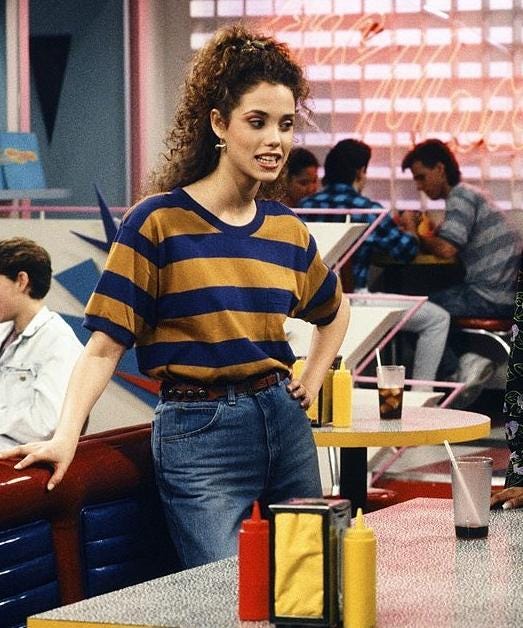What Jessie Spano Taught Me
Feminism began piling up in my life. It was me, this snowball, and Jessie Spano
Rage & Softness is reader-supported! Thank you to the folks who pay monthly to support my work. If you want to upgrade to paid, go here.
Add your favorite song to the newsletter Playlist!
Please “heart” or share my writing with your community and comrades! Forward this email to a friend, put it in your own newsletter, screenshot and share it on social media.
If you would like to pay for a subscription, but don’t want to do so through Substack, you can pay via my Venmo or PayPal. Also, if you’d like a paid subscription, but can’t afford it, please email me and I’ll add you—no questions asked.
CONTENT NOTE: mention of sexual assault
Jessie: “Slater, haven’t you heard of the Women’s Movement?”
Slater: “Sure… put on something cute and move it into the kitchen.”
No switch was turned on. There was no “light-bulb-moment.” It was more like an ever-growing snowball. Feminism began piling up in my life. It was me, this snowball, and Jessie Spano.
I didn’t want to be a feminist, in part because of Jessie Spano. I was eight-years-old, and my after school TV-watching included “Saved By The Bell.” I didn’t like Kelly Kapowski, I wanted to be Lisa Turtle, and I hated Jessie Spano.
Jessie Spano was a second-wave feminist caricature. Defining traits? Annoying! Angry! Serious! She was also dating a (in her words) “chauvinist pig.” She struggled with a caffeine pill addiction. Her parents were divorced, like mine. Jessie was more multidimensional than my eight-year-old self gave her credit for. The character of Jessie Spano was created specifically for Elizabeth Berkley, who had previously auditioned for the role of Kelly Kapowski. The producers couldn’t decide between her or Tiffani-Amber Thiessen, so they dreamed up a man-hating feminist.
My eight-year-old self wanted no part of Spano’s regime. She couldn’t take a joke, she wasn’t fun, she was whiney, and a prude. Jessie was incredibly smart and I hated that about her, too, since I deeply struggled in school. She also had big curly hair and I was deep in my hatred of having curls. I was annoyed just seeing her on the screen.
I grew up with a staunch feminist mother. When I was in elementary school, my mom went back to college while working full time. She then went on to get her master’s degree while my brother and I were still quite young. She was part of the “women can have it all” generation. I don’t remember her forcing any feminist doctrine down my throat, but it seemed to be in all the things she did. She would tell me about the sexism she experienced. She wanted to be a doctor, but her parents wouldn’t help pay for it because women weren’t supposed to be doctors. She went to nursing school instead. We never talked explicitly about women and labor, but I witnessed her actions as she worked a job, went to school, and parented her children.
My snowball of feminism grew.
In middle school, my afternoon TV-watching continued with seeing what wild feminist antics Jessie Spano would get up to next. Except, this time—when watching—I stopped hating her, and started feeling pissed off.
I was pissed off at her character. I was pissed off at the men who created her. I was pissed off at the boys in middle school who made me feel small and insignificant and dirty and ashamed. I was getting angrier, but taking this anger out on girls. I understood briefly why some girls would say: “I just get along better with boys.” This internalized sexism stuck to my insides. The snowball lost some water.
I was no longer mad at Jessie Spano or annoyed by her. I was realizing how fucked up the representation of women was in this culture. I didn’t know what to call it, but it ignited something inside of me. The snowball bloomed.
A friend introduced me to Bikini Kill in 8th grade, and I listened to Pussy Whipped every day before school like a ritual. I started an all-girl band called The Aviators with my two best friends, and sounded nothing like Bikini Kill, but had fun nonetheless. I played guitar, and sang all the songs sullen teenagers sing. Our band was beautifully emo (and feminist) in its execution. We had problems, though—nothing dark like on a VH-1 Behind The Music episode—but enough problems to break us up. I began reading a lot of poetry by women. I began listening to more women-fronted bands. It would still be years before I learned about white feminism.
“Saved By The Bell” was on syndication when I was in high school. Fifteen-year-old me would come home after school and turn on the TV. I wanted to make sure Jessie’s hair was still curly and that her brand of feminism was still taunting A.C. Slater.
I started to call myself a “Feminist.” The snowball grew bigger.
The summer before college, an older guy I was dating assaulted me. I felt a mess, but a survived mess. At some point, I started thinking about what if there was a storyline where Jessie Spano got raped. Would she have been blamed because she was a feminist? Was feminism dangerous? Was I identifying with danger? This is what anti-feminists want you to think, of course. Jessie Spano was only to be laughed at—not taken seriously. I was not to be taken seriously.
In college, I learned about feminism from an historical and academic standpoint. I learned about different theories, waves, and issues. I began calling myself a feminist louder than I had previously. I went to rallies, marches, protests. And guess what? I became Jessie Spano—or so my artsy boyfriend at the time thought.
He thought my anger was useless. He and his best friend made fun of my attendance at UW-Madison’s, “Take Back The Night.” I saw red. I fought with him, I yelled at him, I cried. I told him how important this was to me. How good I felt about attending this particular march. He apologized, but the damage was done. My monologue could have been said by Jessie Spano herself: “This is important! Listen to me! Why do you think this is funny? This isn’t funny!” I should have just called him “Slater,” laughed, curtseyed, and pretended it was all part of some feminist art piece. I dumped him, but not soon enough. The snowball was large and in charge.
Years later, I was back at home during winter break working on my graduate thesis. Day and night, I researched various aspects of domestic violence and the ineffectiveness of restraining orders. I needed a break. I decided to turn the TV on, and there was Jessie Spano traipsing across Bayside High’s hallway, snooty and determined.
I laughed and everything felt right.
NEW THING I’M STARTING FOR PAID SUBSCRIBERS: a book column! I will be listing new, upcoming books (in various genres) by authors from marginalized communities (women, bipoc, disabled, queer, poor, etc) for each month. These won’t be reviews, because that would mean I would have to read a lot of stuff that I sadly don’t have time to read at the moment. My librarian self has wanted to do something like this for a while. I’m hoping to start this column in July, but it might have to wait until August. Upgrade to paid here!
What Pro-Palestine Students Confront When Their Universities Turn Against Them - Lylla Younes
“Tear Down the Walls”: The 1972 Berkeley Prison Action Conference -
Medical (and medical-ish) memoirs I love -
The Radical History of Anarchism and Social Centers -
Rosa Luxemburg Found Freedom Pressing Flowers In Prison - Jenny Odell
How People Are Making Friendship Work *Right Now* -
Ten rules on the art of care -
“Food is Not Just About Survival,” Says Kitchen Committee Organizer - Kelly Hayes
This song from a Madison-based band!










I love this look at a pop-culture influence and the way you grew and changed as you learned over time. Amazing.
I love this so much